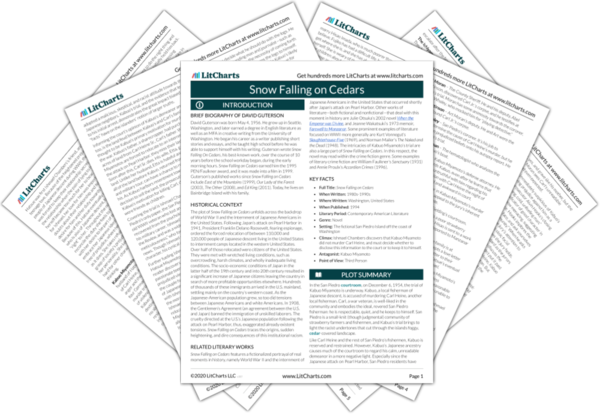In the novel, the courtroom symbolizes humanity’s task of determining the truth from the limited (and often imperfect) facts to which it has access. The world that the residents of San Piedro inhabit is one dictated by bias, cruelty, and the whims of chance. Still, these people are tasked with determining—with certainty—whether Kabuo Miyamoto is innocent or guilty of a brutal murder. Their job isn’t easy, and at times, Guterson seems to doubt that that humans can ever really separate themselves from the subjective truths they’ve come to accept as objective fact. For example, despite the reasonable doubt present in the prosecution’s case against Kabuo, many jurors believe that the “fact” of his Japanese ethnicity is enough to convict him of murder. Their idea of the “truth,” thus, is colored by deeply prejudiced “facts.” When Guterson shifts the narrative back to courtroom or the trial, he means to draw the reader’s attention more explicitly to this battle between fact and truth.
The Courtroom Quotes in Snow Falling on Cedars
“I’m not interpreting or misinterpreting,” Alvin Hooks cut in. “I merely want to know what the facts are—we all want to know what the facts are, Mrs. Miyamoto, that’s what we’re doing here.”

Unlock explanations and citation info for this and every other Snow Falling on Cedars quote.
Plus so much more...
Get LitCharts A+The citizens in the gallery were reminded of photographs they had seen of Japanese soldiers. The man before them was noble in appearance, and the shadows played across the planes of his face in a way that made their angles harden […]. He was, they decided, not like them at all, and the detached and aloof manner in which he watched the snowfall made this palpable and self-evident.
“The storm,” said the judge, “is beyond our control, but the outcome of this trial is not. The outcome of this trial is up to you now. You may adjourn and begin your deliberations.”
“There are things in this universe that we cannot control, and then there are the things we can. Your task as you deliberate together on these proceedings is to ensure that you do nothing to yield to a universe in which things go awry by happenstance. Let fate, coincidence, and accident conspire; human beings must act on reason.”












